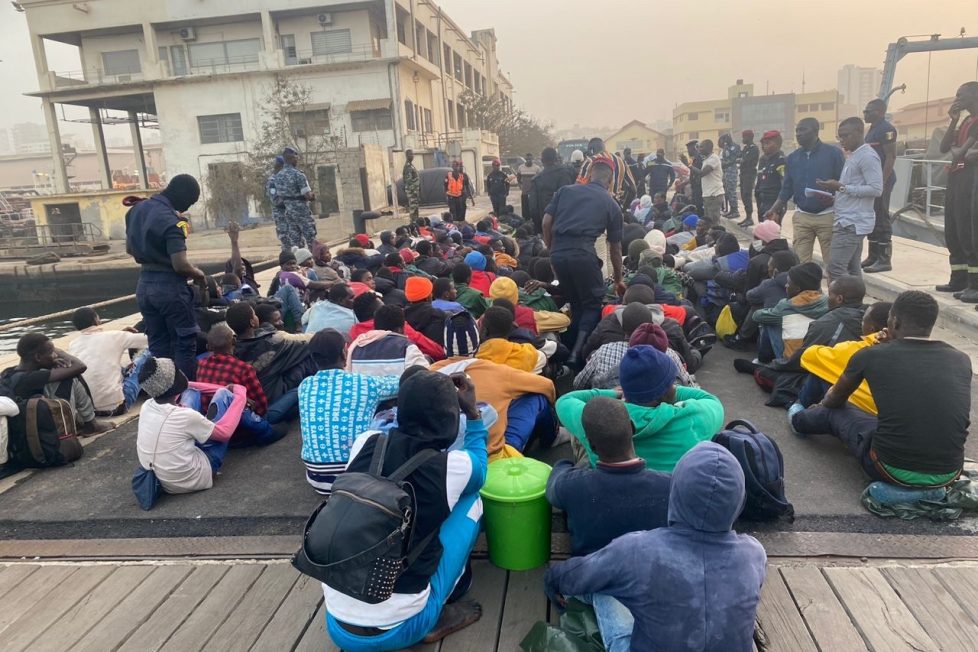A Wave of Despair and Merchants of Death

The open sea has once again taken young Senegalese lives. The capsizing of canoes attempting to reach the shores of Europe has become such a common occurrence in the national news that we end up forgetting that these events should give us the utmost cause for alarm. Above all, they should call for real introspection into the collective failure of a society. This country has plunged into a total lack of understanding with its young people, who have opted to sail off into the deep blue by dint of despair and disappointment.
Capsizing of a Canoe in Saint-Louis: 5 People Arrested in Mbour
In less than a week, tragic events linked to illegal immigration have multiplied. All of which give an idea of the resurgence of this phenomenon, for which no remedy can be found. The outcries and alarmed appeals are still fresh in people’s memories, particularly those of the President of the Republic, Macky Sall, who, was outraged, last November, by a certain passivity on the part of the Defence Forces in limiting the flow of migrants and, above all, thwarting the plans of the smugglers. Nouadhibou, Saint-Louis, Dakhla and Kayar are just some of the names of the sea chasms that swallow up hundreds of lives and shatter as many dreams. We are coming out of a week in which the ocean was a violent wall against which hundreds of our young people saw their dream of an ideal crash.
Read the column – You Won’t Be Sullying Senegal, Let Alone Its Police Force
The day before yesterday, the national Navy reported the interception of a pirogue carrying 154 would-be illegal immigrants by its deep-sea patrol boat « Walo ». The pirogue, which boarded 30 km south of Dakar, was carrying 5 women and a minor. Before we had time to ponder the situation, the sinking of another boat carrying illegal migrants off Saint-Louis led to the recovery of 27 bodies on the beach at Gokhou-Mbathie on Wednesday. The boat was leaving Joal with 317 migrants on board. The search continues by the coastguard and the national navy, and the Governor of Saint-Louis has also set up a crisis unit to supervise rescue operations and the management of the migrants rescued.
For the purposes of this column, I was reading an article in Le Quotidien of September 2023, which looked at the impact of illegal immigration on several Senegalese coastal communities. With populations having turned their backs on the major economic activity of these areas, fishing, and young people uncertain of their future, the option of taking to the seas is the one put on the table as the answer to all the ills. From Guet-Ndar to Elinkine, the communities are battered, with smugglers and their accomplices finding fertile ground for their activities. The complicity is at unsuspected levels, with boats regularly setting sail and a whole clandestine network slipping through the net. Faced with the human tragedy that is irregular emigration under our skies, we cannot fail to apportion blame and impose sanctions at every level where those responsible are identified.
Read the column – One Thousand Reasons to Say No to Amnesty
It brings a tear to the eye to read such violent news about young people rushing headlong towards a wall of illusions to join an El Dorado when all prospects in their native country are blocked. You can’t blame these young people for looking for the best elsewhere if they are struggling to find their place here, and especially if they find themselves left behind.
From a sociological point of view, the collapse of the Senegalese family and the social contract in the land of Teranga should be seriously questioned for anyone who wants to succeed or make a place for themselves at home, having once tasted elsewhere or trying their luck in other climes. This situation goes beyond the economic question itself, because often the would-be travellers are not without resources to organise their odyssey. When companies see some of their middle managers, juniors or technicians abandoning their careers to gather their savings and, clandestinely, attempt the odyssey to Nicaragua, with the United States of America as their final destination, the damage is profound. For the moment, there is no record of the number of lives lost on the road to Nicaragua, but we can fear the worst with the craze for the American dream. The tribulations of our fellow citizens on this road should be enough to demotivate any would-be adventurer, but the call of the Atlantic crossing is stronger.
Last month, the Senegalese consul in Dakhla in southern Morocco, Babou Sène, revealed that almost 3,715 compatriots had been repatriated, following failed attempts to reach Spain by sea. Hundreds of others preferred to stay in Morocco to try their luck. This says a lot about the mindset of would-be migrants, who fiercely refuse to contemplate any kind of return, even if they are saved from all the dangers of crossing to Europe. The affront of social failure that a return to the fold would represent is hard to deconstruct!
When all there is is despair and merchants of death are knocking on doors, you can’t deny people the temptation to do their worst. If Senegal has to admit to a collective failure, it is that of having left its young people to fend for themselves, and who find surfing the waves of death as the only way out.
By Serigne Saliou DIAGNE / saliou.diagne@lequotidien.sn

